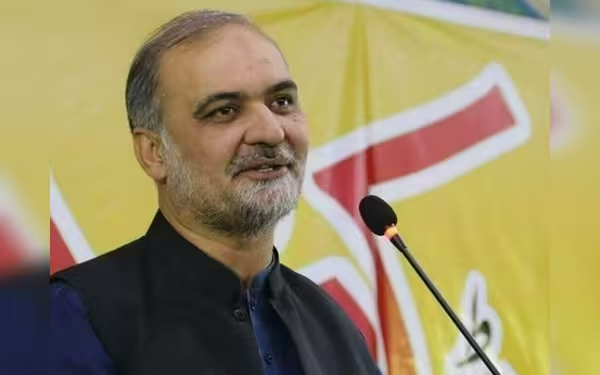Saturday, November 16, 2024 07:45 PM
JI Chief Hafiz Naeem-ur-Rehman Calls for Judicial Integrity Amid Political Crisis
- Hafiz Naeem-ur-Rehman opposes proposed constitutional amendment.
- Calls for Chief Justice to reject tenure extension.
- Accuses government of breaching parliamentary norms.
 Image Credits: brecorder
Image Credits: brecorderHafiz Naeem-ur-Rehman urges Chief Justice to reject controversial amendment amid Pakistan's political crisis.
In recent times, Pakistan has witnessed a growing political crisis, with various factions expressing their concerns over the functioning of the judiciary and the government. The Chief of Jamaat-e-Islami, Hafiz Naeem-ur-Rehman, has stepped into the spotlight, voicing strong opposition to a proposed constitutional amendment that seeks to alter the age and number of Supreme Court judges. This amendment has sparked significant debate and controversy, raising questions about the integrity of the judicial system and the government's intentions.
During a press conference held at Mansoorah, Rehman made it clear that he finds the proposed changes "unacceptable." He urged the Chief Justice of Pakistan to take a stand against the amendment, suggesting that the Chief Justice should publicly refuse any extension of tenure and consider resigning if Parliament passes the amendment. Rehman believes that such actions are crucial for restoring faith in the judiciary and resolving the ongoing political turmoil.
Rehman did not hold back in his criticism of the government's approach to the amendment process. He accused the authorities of breaching parliamentary norms by keeping the draft of the amendment hidden from members of Parliament. This lack of transparency, according to him, undermines the democratic process and raises serious concerns about accountability.
In light of these pressing issues, Jamaat-e-Islami plans to consult with legal experts on a range of topics, including the controversial "Dubai leaks," the interest-based economy, the Independent Power Producers (IPPs) agreement, and the proposed constitutional amendment. Rehman emphasized that these consultations are essential for the party to formulate a well-informed strategy and communicate effectively with the nation.
The political landscape in Pakistan is undoubtedly complex, and the actions taken by leaders like Hafiz Naeem-ur-Rehman could have far-reaching implications. As the situation unfolds, it is crucial for citizens to stay informed and engaged in discussions about the future of their country. The call for transparency and accountability in governance is more important than ever, and the response from the judiciary and the government will be closely watched by the public. Ultimately, the resolution of this political crisis will depend on the collective efforts of all stakeholders involved, ensuring that the principles of democracy and justice are upheld.













